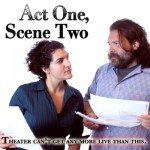 Generally, it’s easy to find out the run-time of a performance. Just ask the box-office or an usher. If you’re not enjoying yourself at the theatre, you can either leave (if it’s feasible to do so) or at least know exactly how long you’re going to have to sit there before the curtain comes down and you can escape.
Generally, it’s easy to find out the run-time of a performance. Just ask the box-office or an usher. If you’re not enjoying yourself at the theatre, you can either leave (if it’s feasible to do so) or at least know exactly how long you’re going to have to sit there before the curtain comes down and you can escape.
But what if nobody, not even the actors, has a clue when the play will finish?
Such was the case at last night’s performance of Act One, Scene Two, the intriguingly-planned (if awkwardly executed in the case of last night) latest project of the Un-Scripted Theater Company, a San Francisco-based improv troupe.
The concept behind the show is very interesting: For every night during the six-week run (which goes through August 20) the company has asked a different playwright to create the opening scene for a play. A bunch of talented local dramatists is participating in the endeavor including Lauren Yee, Daniel Heath, Dan Wilson and Tom Bauer. At the start of the show, the playwright comes on stage and talks about his or her playwriting vision, both as it relates to the scene devised for this project and to their work as a whole. Then the actors perform the opening scene before continuing onwards with their own fully improvised development of the plot, characters and themes started by the dramatist.
Last night, Yee, the talented young playwright behind Impact Theatre’s Ching Chong Chinaman among other works, delivered a scene set in an airport terminal in which a woman, one Karen Zhang, is being repeatedly paged over the airport’s intercomm system to no avail. Yee was in Philadelphia for the performance, so the eight-strong cast (which included sound and light improvisors) screened a video interview conducted with the playwright a few days ago for the audience.
I was engrossed by this bit of “process-in-motion” as I watched and listened to Yee talking about her various dramaturgical interests. Her preoccupations included creating multiple roles for individual actors, working with a non-linear structure, working towards a pay-off at the end etc.
The cast managed to absorb a lot of this information quite cleverly. The first half of the subsequent play they performed, starting with Yee’s script (which none of them, we were told, had seen before they arrived at the theatre last night) and then continuing on “blind”, featured a few flashes of inspiration. Actors did fulfill on the playwright’s wishes, playing multiple parts and presenting a couple of scenes in flashback and fast-forward mode. One scene, in which a seven-year-old boy with OCD or autism or some similar affliction was visited by his future self, was particularly captivating. The grown-up version of the boy kept producing useless objects from his pockets and insisting the importance of these objects (a laser pointer, a santa hat etc) to the boy’s future happiness. This was wonderfully off-beat and I hoped that the actors would run with this idea in future scenes.
Alas, as the play dragged its way onwards, the only thing they ran on with was time. Scene after stagnant scene passed before our eyes, each one promising a potential ending, but never delivering. The actors had no idea how to finish what Yee had started and it was torture for the audience as a result. Awkward silences prevailed. A gun was produced at one point (hooray, I thought, this must be the climax) only to be withdrawn. At another point, several audience members clapped. But again this proved to be a false hope. The whole thing spluttered out eventually, when one of the several disembodied intercomm voices heard throughout the drama finally called the performers forwards for a curtain call as an air steward might summon a passenger to their take-off gate.
In short, never has a playwright’s demand for a big pay-off been so poorly compensated!
I don’t want to be too rude about Act One, Scene 2, though. It’s a bold concept and the actors clearly have good improv chops. Plus, Yee didn’t provide them with material that was all that inspiring to begin with. By saying that the work was predominantly a drama rather than a comedy (as Yee did in the video at the start of the show) Yee inadvertently threw a curveball at the performers: Improv tends to work much better in a comic rather than dramatic format. There’s a reason, after all, why Who’s Line Is It Anyway? works. Still, it was brave of the troupe to stick so diligently to seriousness.
